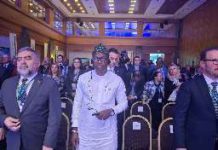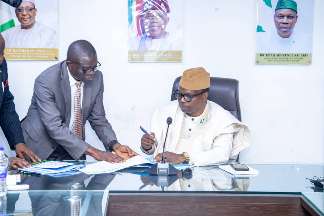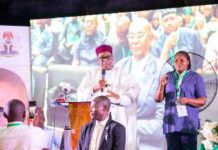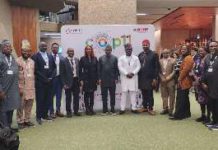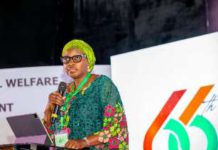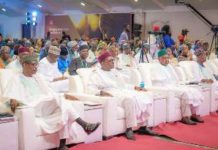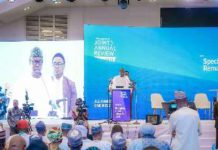By Joy Odor
With funding from European Union (EU), the Government of Nigeria in collaboration with the United Nations Children’s Fund (UNICEF), the International Labour Organization (ILO), the United Nations Population Fund (UNFPA), and the Danish Refugee Council (DRC) on Monday launched three landmark EU-funded initiatives worth over €60 million (approximately USD 65 million).
These projects, to be implemented over a four-year period (2024–2027), aimed to strengthen social protection, health systems, and sustainable solutions for displacement-affected communities in Nigeria.
Speaking at the launch, His Excellency, the Executive Governor of Sokoto State, Dr. Ahmed Aliyu, reaffirmed the administration’s commitment to prioritizing the welfare of its people in line with its 9-point smart innovative agenda.
“Our administration prioritizes the well-being of women, children, and vulnerable populations.
These EU-funded initiatives—SUSI, SARAH, and Durable Solutions—will not only improve access to critical services but also build long-term resilience and sustainable systems. Sokoto is proud to champion these efforts.”
In his address, Gautier Mignot, the European Union Ambassador to Nigeria, reaffirmed the EU’s deep commitment to equity and inclusion: “The EU is proud to invest in Nigeria’s future through programmes that leave no one behind—whether it is better healthcare, livelihood support, or social protection.
These three initiatives are part of our commitment to long-term, people-centered development and illustrate our enhanced support, particularly in the North-West of Nigeria.”
The projects include:
Supporting Sustainable Social Protection Systems in Nigeria (SUSI), jointly implemented by UNICEF and ILO, SUSI aims to strengthen Nigeria’s social protection infrastructure by improving the National Social Register, enhancing management information systems, building institutional capacity, and reinforcing legal and policy frameworks.
The project is being implemented in Abia, Benue, Oyo, and Sokoto States.
Strengthening Access to Reproductive and Adolescent Health (SARAH), implemented by UNICEF and UNFPA, aims to improve access to high-quality reproductive, maternal, newborn, child, and adolescent health and nutrition services that are sensitive to gender and the needs of young people, including support for those affected by gender-based violence, in Sokoto, Adamawa, and Kwara States.
The project is expected to reach over 45 million children, adolescents, and women over four years.
Support for Protection, Assistance & Durable Solutions (SPADS), led by the Danish Refugee Council (DRC) with partners Pro-Health International (PHI) and Joint IDP Profiling Service (JIPS), this project supports community-led local action plans to promote long-term solutions for internally displaced persons (IDPs) and host communities.
It provides livelihood support, boosts local employment, and strengthens resilience using a climate-smart and inclusive approach.
Also commenting, Cristian Munduate, the UNICEF Representative in Nigeria, emphasised the importance of resilience and system strengthening: “Social protection is a vital mechanism for reducing poverty and promoting inclusive development.
And through SARAH, we are improving healthcare access for girls and mothers.
Together with the EU, ILO, UNFPA, and DRC, we are helping Nigeria build strong systems that protect every child.”
Speaking, Dr Vanessa Phala, ILO Country Director, underscored the foundation of sustainable policy: “This project strengthens the legal and institutional bedrock Nigeria needs for effective social protection.
We are proud to work alongside the government and communities to build structures that ensure dignity for all.”
Also Dr. Gifty Addico, UNFPA Resident Representative in Nigeria, noted the importance of healthcare equity: “Every adolescent and every woman has the right to safe, accessible, and quality healthcare. SARAH ensures these rights are upheld and that girls and women—especially survivors of GBV—are never left behind.”
While Pierre Mendiharat, the DRC Country Director, emphasized the importance of community-driven solutions: “This project is based on what communities themselves have identified as priorities.
By co-creating Local Action Plans, we are building the foundation for durable, inclusive futures for displaced families and their hosts.”
Present at the launch were senior government officials from Sokoto state, traditional and religious leaders including the Sultan, as well as over nine EU Member States’ ambassadors and chargés and other members of the diplomatic community, highlighting the strong national and international collaboration behind these initiatives.
The three EU projects—SUSI, SARAH, and SPADS—represent a significant investment in Nigeria’s people and future.
Together, they align with the Federal Government’s Renewed Hope Agenda and National Development Plan (2021–2025), marking a unified step forward in promoting inclusive growth, social equity, health access, and resilience for all.


